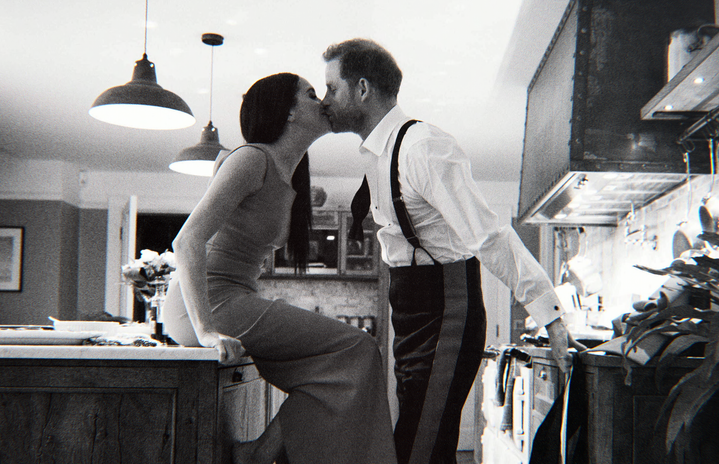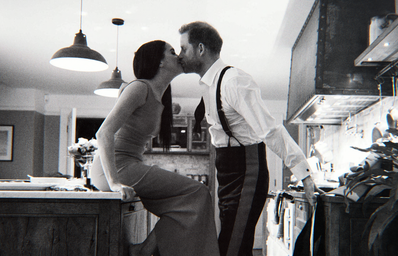By Chloe Barth
May 19, 2018: Prince Harry stands at the altar of Windsor Castle, awaiting his bride-to-be, Meghan Markle, as she is walked down the aisle by Prince Charles. Their bishop quotes Dr. Martin Luther King Jr.’s “Love Your Enemies” speech. After the ceremony, “Stand By Me” is performed by the Kingdom Choir, a British gospel choir. The royal wedding is beautiful, and historical.
Meghan Markle’s welcome into the royal family signified a cultural shift in Britain. Meghan, a biracial woman, is one of the first women of color in the British royal family (Evidence suggests that Queen Charlotte of the 16th century may have had Black ancestry as well). Her wedding with Prince Harry blended British and American cultures, with respect to Markle’s own mixed background as well. This new era of the British monarchy was widely embraced. An estimated 29 million people tuned in for the royal wedding, and more than 100,000 people stood outside Windsor Castle during the ceremony.
But since the couple began dating in 2016, the press developed a different narrative. Articles about Meghan were rife with harmful stereotypes about Black women, such as her apparent bullying and diva attitude. Meghan was pitted against Kate Middleton, Prince Harry’s sister-in-law. Meghan was often criticized for the very same things for which Princess Kate was praised. One of many double standards set for the two is evidenced by the Express articles: “Kate’s morning sickness cure? Prince William gifted with an avocado for pregnant Duchess,” and, “Meghan Markle’s beloved avocado linked to human rights abuse and drought, millennial shame.” Prince Harry was the only royal family member to speak out against this relentless media attack. He criticized the “racial undertones of comment pieces,” such as the Daily Mail article, “Harry’s girl is (almost) straight outta Compton.” Meanwhile, the monarchy failed to defend Meghan. According to Prince Harry, his brother and father actually condemned him for the statement, believing it highlighted their failure to protect their own wives.
On February 19, 2021, Buckingham Palace officially announced that Prince Harry and Meghan Markle would step down from their royal duties. The pair now lives in California. As speculation continues about their departure, they are now speaking out to correct the misconstruction of their characters. The couple sat down with Oprah Winfrey for a 2-hour interview in 2021 and released a six-part docu-series on Netflix. And on January 10, 2023, Prince Harry published an extensive autobiography entitled Spare.
The book has much larger political implications about racism and the Commonwealth. Prince Harry admits his own wrongdoings, such as wearing a Nazi uniform to a costume party in 2005. He speaks of the unconscious bias that comes with living in a bubble such as the British monarchy. While the Prince is not without fault, he speaks more openly about racism than expected from any royal family member. Before reading his autobiography, here are some important things to know:
A brief summary:
Prince Harry details his life from the night his mother died until the book’s publication. His mother, Princess Diana, famously broke royal family protocol by divorcing Prince Charles in August 1996. One year later, she died in a horrific high-speed car accident in an attempt to escape paparazzi. Prince Harry was 12 at the time. Much of his life since has been spent processing the trauma of losing his mother at such a young age, and building resentment towards the press for their interference in his family’s life. The final third of his book is dedicated to his relationship with Meghan Markle. Spare portrays a warmer, more loving image of Meghan in defiance of the prevailing press narrative. Readers become privy to intimate details of their relationship before the media frenzy subjected Meghan to constant harassment and death threats. Fearing Meghan would meet the same fate as his mother, Prince Harry explains their decision to ultimately leave the royal family.
The family tree:
Queen Elizabeth II was the longest reigning monarch in British history. She ruled from 1952 until her death in 2022. She and her husband Prince Philip had four children: Prince Charles III, Princess Anne, Prince Andrew and Prince Edward. As their oldest son, Prince Charles was first in line for the throne. Their second oldest son, Prince Andrew, held the role of spare growing up. Spares in the royal family are prepared to take on the role of heir should anything happen to their older sibling. As the younger brother, Prince Harry is spare to Prince William’s heir. They are the sons of Prince Charles and Princess Diana. After their divorce, Prince Charles married his ex-girlfriend, Camilla Shand. They ascended the throne following the deaths of Queen Elizabeth II and Prince Philip. Their coronation is set to take place on May 6, 2023, when they will officially begin their rule over Britain and the rest of the Commonwealth.
What is the Commonwealth?
The Commonwealth is home to 2.5 billion people. Its official website defines itself as “a voluntary association of 56 independent and equal countries in Africa, Asia, the Americas, Europe and the Pacific.” What the site fails to mention is that most former British colonies are now a part of the Commonwealth. While self-governing, Commonwealth states are united under the Commonwealth governance. The Head of the Commonwealth is a symbolic figurehead. They are appointed by leaders of the Commonwealth, but the role typically goes to members of the royal family. Queen Elizabeth II was the most recent head of the Commonwealth, and her son, Prince Charles, now holds the title. Prince Charles also holds the power to appoint the British prime minister, open and close Parliament, and head the Armed Forces. There are currently 14 Commonwealth realms aside from Britain which recognize the British monarch as head of state. Additionally, Britain maintains 14 British Overseas Territories. While these states are self-governing, Britain holds responsibility for their defense and foreign relations. Britain continues to exercise unparalleled control over one-third of the world population. Although not formally colonization, the Commonwealth maintains a diplomatic hold over foreign affairs reminiscent of its colonial history.
What is the role of the British royal family today?
Members of the royal family are essentially figureheads. They frequently embark on royal tours, wherein members of the British royal family visit other countries to encourage diplomatic relations. These tours, while political in nature, often do not contain any outstanding political statements. In 2022, Prince Charles and Prince William tip-toed around the topic of slavery. “Slavery is abhorrent,” declared Prince William, “and it should never have happened.” Neither Prince William nor his father directly apologized for slavery.
The royal family is ranked annually by number of royal engagements and popularity. The Court Circular tracks each member’s number of royal engagements in the calendar year, while polls measure the popularity of family members. Participants mark if they have a positive, negative, or neutral view of each member. In 2018, Prince Harry was the most popular royal, outranking even his grandmother Queen Elizabeth II at a 77 percent positive approval rating.
Why is the monarchy threatened by Meghan Markle?
Of the 56 Commonwealth countries, 34 are in the African and Caribbean/American regions. These regions were historically populated by black and brown indigenous people. Meghan Markle’s entrance into the royal family came around the time of a large cultural shift. In 2021, the Commonwealth state of Barbados transitioned from a monarchy to a republic. This choice effectively removed Queen Elizabeth II as head of state and replaced her with President Sandra Mason. The 2017 book “Why I’m No Longer Talking to White People About Race” by Reni Eddo-Lodge follows the author’s difficulty as a Black British woman living in a country filled with people desperate to deny its racist history. Works such as these disrupt the norm. There is a precedent of British colonization which has largely gone unchallenged. Meghan Markle’s presence on royal tours called into question the foundation on which the British monarchy once stood: the notion that white, British people born into the royal family had an inherent right to rule over people of color.
The public was generally receptive to Meghan’s entrance into the royal family. After her engagement to Prince Harry was announced, she received her first official approval rating. 49% of Brits had a positive view of the princess-to-be, beating out members higher in the line of succession such as Prince Charles and Camilla. In addition, this study found that most Brits did not care if a royal family member married someone of a different ethnicity. Yet racist media articles transformed positive attention toward the newest royal into a smear campaign. As of January 2023, Meghan Markle’s approval rating stands at -13. Spare provides unprecedented access to the inner workings of the British monarchy, and in doing so, reveals just how deeply the monarchy failed Meghan Markle. Arguably Spare’s biggest revelation is the sheer amount of control that the monarchy has over the press, and its conscious decision not to protect Meghan Markle. Wasting what could have been the beginning of correcting Britain’s racist history, the monarchy instead stood idly by as the media ignited British racism which transformed Prince Harry’s home country into an unsafe environment from which he had to remove himself, his wife and their two children.

